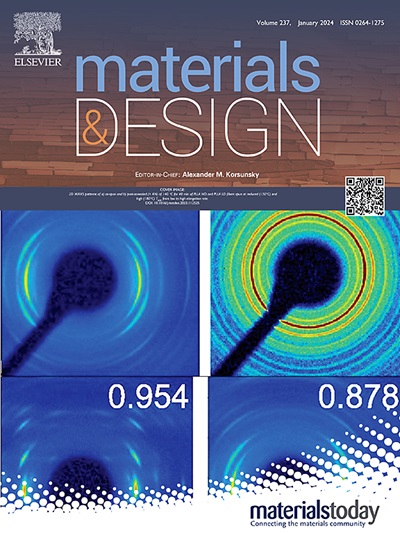Ply-ply friction behavior between unidirectional thermoplastic prepreg plies during thermoforming: Characterization and modeling
IF 7.6
2区 材料科学
Q1 MATERIALS SCIENCE, MULTIDISCIPLINARY
引用次数: 0
Abstract
The ply-ply friction behavior of unidirectional carbon fiber reinforced polyphenylene sulfide (UD CF/PPS) prepreg in thermoforming was investigated through an improved pull-through testing system. The effects of temperature, normal force and slipping velocity were considered in testing. The results indicated the existence of three key mechanisms underlying slipping: namely the resin shear, fiber–fiber contact and fiber-resin interaction. A three-stage division of the experimental curve was proposed, and several factors were defined to establish a quantitative definition of the ply-ply friction behavior. The results showed that the influence of slipping velocity is particularly evident. Its post-yield stress (12.8 kPa), steady-state CoF (0.118) and residual stress (0.705 kPa) were the highest, exhibiting the largest changes of 957.9 %, 736.9 % and 47.2 %, respectively. This indicated the strong contribution of resin in ply-ply friction. In addition, the Stribeck analysis also suggested the dominance of hydrodynamic lubrication condition in slipping. Based on the experimental results, a simple phenomenological model was proposed based on experimental curves to accurately describe the effects of processing parameters. This work presents a comprehensive characterization of the ply-ply friction behavior of UD CF/PPS prepreg in thermoforming, providing a substantial experimental foundation for the subsequent simulation research.

热成型过程中单向热塑性预浸料层间的摩擦行为:表征和建模
通过改进的拉通测试系统,研究了单向碳纤维增强聚苯硫醚(UD CF/PPS)预浸料在热成型过程中的层间摩擦行为。测试中考虑了温度、法向力和滑动速度的影响。结果表明存在三种关键的滑动机制:即树脂剪切、纤维-纤维接触和纤维-树脂相互作用。提出了实验曲线的三阶段划分,并定义了几个因素,从而建立了层间摩擦行为的定量定义。结果表明,滑动速度的影响尤为明显。其屈服后应力(12.8 kPa)、稳态 CoF(0.118)和残余应力(0.705 kPa)最高,分别出现了 957.9 %、736.9 % 和 47.2 % 的最大变化。这表明树脂在层间摩擦中的作用很大。此外,Stribeck 分析还表明流体动力润滑条件在滑动中占主导地位。根据实验结果,提出了一个基于实验曲线的简单现象学模型,以准确描述加工参数的影响。这项研究全面描述了 UD CF/PPS 预浸料在热成型过程中的层间摩擦行为,为后续的模拟研究提供了坚实的实验基础。
本文章由计算机程序翻译,如有差异,请以英文原文为准。
求助全文
约1分钟内获得全文
求助全文
来源期刊

Materials & Design
Engineering-Mechanical Engineering
CiteScore
14.30
自引率
7.10%
发文量
1028
审稿时长
85 days
期刊介绍:
Materials and Design is a multi-disciplinary journal that publishes original research reports, review articles, and express communications. The journal focuses on studying the structure and properties of inorganic and organic materials, advancements in synthesis, processing, characterization, and testing, the design of materials and engineering systems, and their applications in technology. It aims to bring together various aspects of materials science, engineering, physics, and chemistry.
The journal explores themes ranging from materials to design and aims to reveal the connections between natural and artificial materials, as well as experiment and modeling. Manuscripts submitted to Materials and Design should contain elements of discovery and surprise, as they often contribute new insights into the architecture and function of matter.
 求助内容:
求助内容: 应助结果提醒方式:
应助结果提醒方式:


